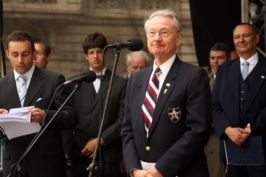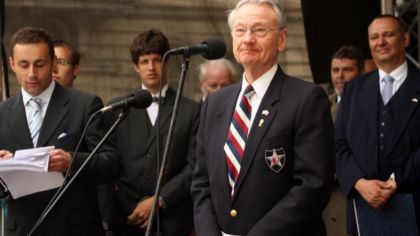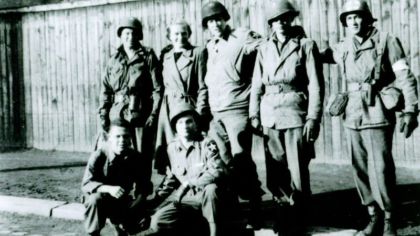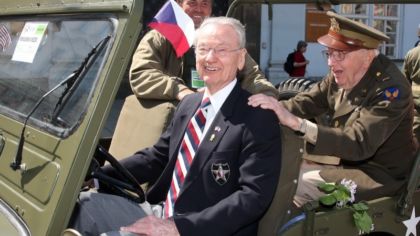Earl Ingram
A Veteran’s Story
Earl Ingram, 2nd Infantry Division
When we arrived in Pilsen late in the afternoon of May 7, 1945, as members of the 2nd Infantry Division, we were greeted by the most grateful, joyous people I had ever seen. Their gratitude was demonstrated in many ways, but three that stand out in my memory are: bathtubs, beds and clean clothes. Those wonderful people took us into their homes, the ladies spent countless hours washing and ironing our uniforms and other clothing and helping us to feel like civilized human beings again. For me it was a happy time. Germany had been defeated, the war in Europe was over, and we believed that we would soon return home to loved ones and friends. Meanwhile, the people in Pilsen who suffered the hardships of foreign occupation for more than six years and Allied bombings, treated us with the greatest admiration and respect. Our duties as soldiers were relatively light. There were parties and other social events being enjoyed by many, with much free time for all of us. Soldiers, with minds free of war, took advantage of the opportunities for relaxation.
However, all of my time in Pilsen was not free. In addition to my normal duties as a platoon leader, many other lieutenants and I were assigned to special duty processing and screening German prisoners of war to try to identify members of the SS and, in some cases, to release regular German soldiers to return to their homes. This special duty and a happy two weeks in Pilsen ended abruptly without prior warning when my company was ordered to move to duty on the demarcation line facing the Russians. About the same time, we were informed that the 2nd Infantry Division would be transferred to the Pacific Area to help finish the war with Japan.
Travel time by truck from Pilsen to the demarcation line on 23 May was relatively short. Company headquarters was established in Stupno, and my rifle platoon of about 40 men was assigned to roadblock duty in another nearby village – Kříše. As in Pilsen, we were billeted in homes.
Orders from my company commander were short and clear – “we would not cross the line to the other side and would not permit Russians to cross to the American side.” As platoon leader, I did not envision any problem; Americans and Russians were allies. Two Sherman tanks supported my platoon. They were positioned on the narrow road near the crest of a knoll at the entrance to the village. From that position, only the tops of the houses were visible in the nearest village occupied by the Russians – Břasy.
While on roadblock duty I had contact with Russian soldiers twice. The first tested my will; the second tested my reflexes. One day a Russian captain with comrades arrived in a small automobile at the position where our tanks were located. His reason was not clear, but he wanted to visit a house about 150 meters within our side of the line. I politely refused his request and explained my orders. The tanks were “the line” which I could not permit him to cross. After a very lengthy discussion, his proposed solution for the impasse was for me to move the tanks back 150 meters. The tanks were not moved, and the unhappy captain and his comrades left and did not return.
Another day, while I was busy with the platoon, my radio/telephone operator who could communicate in Russian informed me that a Russian lieutenant was at the platoon command post and had requested to speak with me. I hurried to meet the lieutenant. He requested permission to march some Russian soldiers through the village and explained that he was moving them from a medical treatment facility back to their units. I asked, “Where are they now?” He pointed and said, “There.” I turned, looked and saw about 200 solemn-looking Russian soldiers sitting beside the road a short distance away on our side of the line. Apparently, the lieutenant was trying to take a shortcut to his destination or he made a wrong turn. I quickly told the lieutenant to proceed through the village. He seemed to be pleased. I was also pleased to see the end of his column disappear over the knoll to the other side toward Břasy.
Our duty on the demarcation line ended on June 7, when we were replaced by another American unit. We travelled south by truck to Radonice. It was the beginning of our long move to America preparatory to the expected transfer to the Pacific Area. In Radonice we stayed in the homes of villagers and had the opportunity to watch them in their daily activities as we waited for our next move. The peaceful scene of a young Czech girl holding a long cane and gently coaxing her flock of geese toward a water hole remains with me. Our watching and waiting lasted only ten days.
On June 17, we left Radonice and Czechoslovakia. About five weeks later, after travelling almost 8,000 kilometers by truck, train, ship, and then train again, I arrived home. Being with loved ones, and with orders in my pocket authorizing a furlough, the reality that our war with Japan was still raging and that I was required to rejoin my unit in Texas at the end of my furlough was pushed to the back of my mind.
During my furlough, while relaxing with my wife on the beach in North Carolina in mid-August, we were surprised when we heard the good news that Japan had agreed to surrender. However, the end of the war with Japan did not change my obligation to report for duty in Texas. Immediately after arriving in Texas, I learned that the 2nd Infantry Division would not be transferred to the Pacific Area, and demobilization of millions of Americans then in uniform would occur as quickly as practicable. I took advantage of the demobilization policy and put my uniform aside without the slightest thought that I would be wearing it again in a few months and that I would become a career soldier.
As a career soldier stationed in Germany in 1961, I had the opportunity to look east across the border beyond an unnatural barrier and see a beautiful countryside. I knew that grateful Czech people lived “over there” – people who had made an indelible impression on me in May 1945. At that time, it seemed highly unlikely that I would see those wonderful people again.
Unlikely as it might have seemed, I returned to Pilsen with my wife in 1994 for a short visit to relive the memories of the people and the place where World War II in Europe ended for me. Unfortunately, I was not able to locate the place where I stayed in May 1945. However, while there we were informed about the celebrations being planned for May 1995.
We returned to Pilsen again in May 1995 to join the celebrations and with the determination to find the people who had been so kind to me in May 1945. Following the celebrations, I resumed my search, and with the help of an outstanding interpreter, Mrs. Kamila Velkoborská, I was reunited with two very kind, generous ladies still living on Jablonského ulici – where I stayed in May 1945. These ladies, together with their families, had contributed much more than they could have realized to make my fellow soldiers and me comfortable and to make us feel welcome.
My reunion with the women from Jablonského Street was one of the greatest events of my life. They had not forgotten me! In fact they remembered me so well, I worried a bit and wondered what I might have done that could not be forgotten after fifty years. I was relieved and breathed easier when they gave a good report concerning my earlier behavior. With a good report from them, I felt free to return to Pilsen again and again to relive the warm feeling I experienced in May 1945.
Epilogue:
My wife and I have returned to Pilsen many times since 1994, and the warm feeling gets warmer each time we see old friends and meet new ones. Some of our friends live in Kříše, where my platoon was assigned to duty on the demarcation line on May 23, 1945, following our period of relaxation in Pilsen. Therefore Kříše is also a special place for me.
Through the help of another outstanding interpreter, Miss Patricia Kraftová, I met Mr. Václav Mudra who lived in Kříše. Meeting Mr. Mudra and his family and sharing stories of events from May 1945 filled a vacant spot in my cherished bank of memories of the short time I spent with the Czech people over 64 years ago.
These memories are relived each time I walk through the Patton Memorial Museum. I am very pleased that it was established in Pilsen. In addition to its visible symbol of our historical friendship, it provides a permanent home for hundreds of World War II items that were taken into West Bohemia by American soldiers in 1945. I am also pleased and feel honored that the maps I carried into Pilsen on May 7, 1945, are among these items.
From book 500 hours to victory



